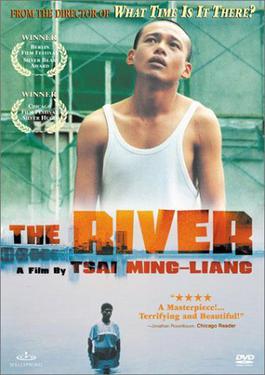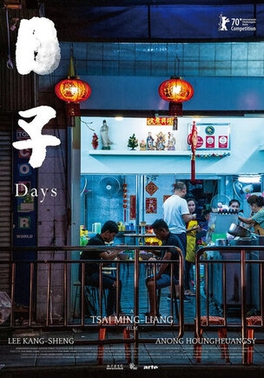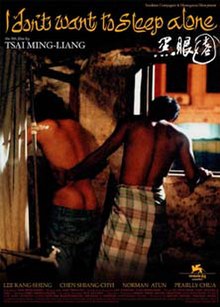
Tsai Ming-liang is a Malaysian filmmaker based in Taiwan. Tsai has written and directed 11 feature films, many short films, and television films. He is one of the most celebrated "Second New Wave" film directors of Taiwanese cinema. His films have been acclaimed worldwide and have won numerous awards at festivals. In 1994, Tsai won the Golden Lion at the 51st Venice International Film Festival for the film Vive L'Amour.

Despite having a flourishing Chinese and Malay film industry in the 1950s and 1960s, Singapore's film industry declined after independence in 1965. Film production increased in the 1990s, which saw the first locally produced feature-length films. There were a few films that featured Singaporean actors and were set in Singapore, including Saint Jack, They Call Her Cleopatra Wong and Crazy Rich Asians.

Goodbye, Dragon Inn is a 2003 Taiwanese comedy-drama slow cinema film written and directed by Tsai Ming-liang about a movie theater about to close down and its final screening of the 1967 wuxia film Dragon Inn.

Vive l'amour is a 1994 Taiwanese New Wave film directed by Tsai Ming-liang. Starring Lee Kang-sheng, Yang Kuei-mei and Chen Chao-jung.

The Wayward Cloud is a 2005 Taiwanese film directed by Tsai Ming-liang and starring Lee Kang-sheng and Chen Shiang-chyi.

The Hole, also known as The Last Dance, is a 1998 Taiwanese drama-musical film directed by Tsai Ming-liang. It stars Yang Kuei-mei and Lee Kang-sheng.

What Time Is It There? is a 2001 Taiwanese film directed by Tsai Ming-liang. It stars Lee Kang-sheng, Chen Shiang-chyi, and Lu Yi-ching.
The Cinemanila International Film Festival is an annual film festival held in Manila, Philippines. It was founded by Filipino filmmaker Amable "Tikoy" Aguiluz in 1999. The focus of the festival is on the cinema of the Philippines as well as Southeast Asian cinema.

Lee Kang-sheng is a Taiwanese actor, film director and screenwriter. He has appeared in all of Tsai Ming-liang's feature films. Lee's directorial efforts include The Missing in 2003 and Help Me Eros in 2007.

Chen Shiang-chyi is a Taiwanese actress. She has appeared in most of Tsai Ming-liang's feature films.
The 1st Asian Film Awards were given on 20 March 2007 at the Hong Kong Convention and Exhibition Centre, on the opening night of the 31st Hong Kong International Film Festival.

Opera Jawa is a 2006 Indonesian-Austrian musical film directed by Garin Nugroho that features traditional Javanese classical music and dance in a setting of opera that is inspired by the "Abduction of Sita" episode from the Ramayana.

Help Me, Eros is the second film from director Lee Kang-sheng, following his directorial debut in 2003, The Missing.

The River is a 1997 Taiwanese film directed by Tsai Ming-liang and starring Lee Kang-sheng, Miao Tien, and Lu Yi-ching. The plot centers on a family who has to deal with the son's neck pain. In 2003, a critic called it Tsai's "bleakest film."
The Skywalk is Gone is a 2002 Taiwanese short film directed by Tsai Ming-liang and starring Chen Shiang-chyi and Lee Kang-sheng.

Face is a 2009 Taiwanese-French film written and directed by Tsai Ming-liang.
Norman Atun is a film actor from Kuala Lumpur, Malaysia.
Film censorship in Malaysia is pervasive since its conception under British rule under the 1908 Theatre Ordinance enacted by the Straits Settlements colonial government starting 1912. Even with the successive independence of these colonies, the Film Censorship Board of Malaysia is the government ministry that which dictates whether, when, and how a film gets released in the country. It is under the control of the Ministry of Home Affairs. The government censors film content for mainly homosexual, political and religious reasons.

Stray Dogs is a 2013 drama film written and directed by Tsai Ming-liang. The Mandarin title of the film is Jiaoyou, which means "excursion." An international co-production of Taiwan and France, the film stars Lee Kang-sheng.

Days is a 2020 Taiwanese drama film directed by Tsai Ming-liang. Typical of slow cinema and many Tsai films, Days is minimalist, slowly paced, and features little dialogue, without subtitles. Lee Kang-sheng plays Kang, and Non is portrayed by Anong Houngheuangsy, a Laotian immigrant to Thailand in his first film role.















